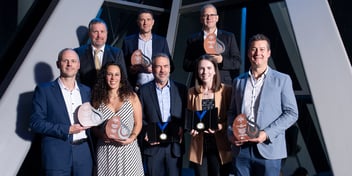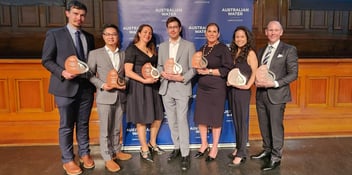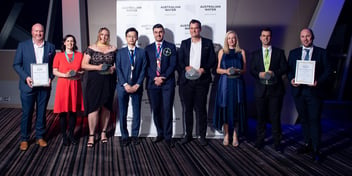Yarra Valley Water wins big for being a restorative water utility
Turning food waste into biogas for electricity has earned a Victorian water utilities business the Leadership in the Circular Economy Award at the 2017 Banksia Sustainability Awards.
Yarra Valley Water’s ReWaste facility diverts about 33,000 tonnes of commercial food waste from landfill each year, with the organic waste used creating enough biogas to run the utility’s treatment plants and exporting surplus energy to the grid.
Yarra Valley Water Managing Director Pat McCafferty said the waste-to-energy project was inspired by a drive to find ways to offset the utility’s impact on the environment, while also reducing costs.
“As an industry, we are absolutely impacted by climate change. The question is: do we do anything about it? We started to think about ways we could play our role in reducing that impact,” he said.
“We had originally committed to providing our services within what we call the ‘carrying capacity of nature’. In other words, not having any negative impacts on the environment.
“But we decided that wasn’t enough as the planet’s environment is still going backwards, so we have now adopted a stand to be a restorative water utility. This means we look for ways to provide net benefits rather than less harm, and to pursue that in a commercially viable way.”
McCafferty said the project ticks a lot of boxes, with the environmental and commercial benefits set to boom following ReWaste’s launch in May 2017.
“The facility is reducing greenhouse gas by producing renewable energy and taking organic waste out of landfill. It’s also providing a new source of revenue because we charge to process the commercial waste,” he said.
“It’s an economic positive for businesses to give us their waste, as well as more socially responsible. We also save money by not having to spend on electricity, where prices continue to increase, because we are producing our own.”
The ReWaste facility is offsetting roughly 23% of Yarra Valley Water’s entire energy footprint, with the utility aiming to be totally renewable by 2025.
And while anaerobic digestion is nothing new for the wastewater treatment industry, McCafferty said pulling off this type of innovation takes a concerted effort to shift perspectives.
“In Melbourne, water utilities already process 70% of the city’s liquid waste just by virtue of having the sewage system. It’s not a big stretch to say we are working in waste management – it’s just a different perspective of what type of waste we are taking,” he said.
“Many water utilities have knowledge of anaerobic digestion. This is the same thing – getting a mixture and managing the bugs, but rather than treating sewage, we are creating biogas to power generators. As an industry, it’s a natural extension.”
McCafferty said Yarra Valley Water expects momentum to lift as more local businesses recognise the opportunity this offers in terms of corporate responsibility. Furthermore, he said the utility is learning more about waste as the project takes on more customers.
“It was a calculated risk, but definitely a risk worth taking. The thing we are learning more about is the untapped resource of waste that exists within Australia. It’s opening up a whole bunch of news doors for streams of waste,” McCafferty said.



